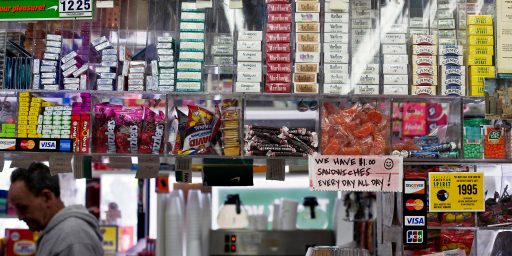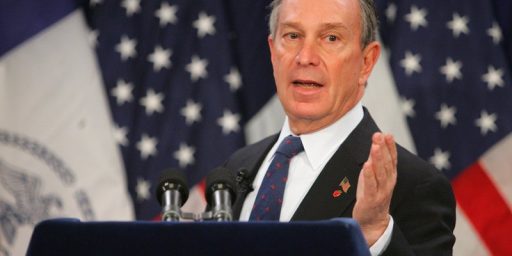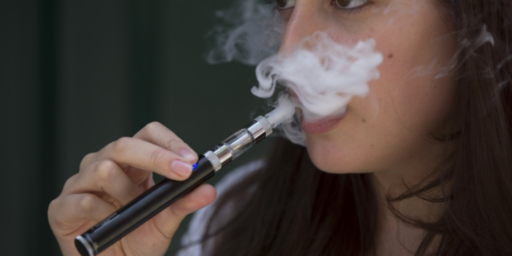Soda Bans and Reductio Creep
San Francisco's ban on sugary drinks is the latest example of nanny state reductio creep.
 Back in 2002, Julian Sanchez, who seems to coin a new meme every couple of years, came up with a beaut:
Back in 2002, Julian Sanchez, who seems to coin a new meme every couple of years, came up with a beaut:
Reductio creep is the process by which an insane extension of some principle, offered as a reductio ad absurdum of that principle, is soon afterwards realized.
His inspiration was a fat guy suing McDonald’s for making their burgers so tempting, thus fulfilling the predictions of those who said this would be the inevitable result of successful lawsuits against tobacco companies.
Well, we’re now seeing the related prophecies of those, like my late father, who saw no end to government intrusions into our personal choices once they got away with banning smoking from public spaces.
Richard Fernandez points to a new San Francisco executive order which “dictates vending machines on city property can no longer dispense Coke, Pepsi and other calorically sweetened beverages. Sports drinks and artificially sweetened water also are included in the ban. Juices must be 100 percent fruits or vegetables with no added sweeteners.” Michigan and other localities are contemplating similar measures.
He titles his post “Kobayashi Maru” after a famous no-win scenario at the fictional Star Fleet Academy but I’m not seeing the connection to his essay. My guess, which indeed prompted me to click over to the post from the excerpt in my feed reader, was that he was going to describe a way in which, following the example of James T. Kirk, the ban would be cleverly circumvented by an industry — or consumers — unwilling to settle for a no-win outcome.
And my guess is that it will be. People aren’t buying Cokes and Gatorade because their preferred alternative, cold water, is unavailable to them. Rather, they decidedly want something sweet and/or caffeinated. So, one presumes that people will either start bringing said drinks to work with them or frequently leave the building to acquire them from street vendors who will inevitably pop up directly outside. If so, then the outcome will be a loss of revenue to the city without the desired health benefit.
That’s, after all, what happened with smoking bans. True, there has been a decline in smoking — albeit one that’s somewhat reversed itself in recent years. But there has also been a loss of productivity as tobacco addicts constantly leave the office and congregate in designated — or even undesignated — smoking areas. And, of course, rather than smoking in their own offices, they now create a disgusting stench right outside the main door that the rest of us have to wade through.






I don’t know man, when surrounded by evidence that people aren’t as rational as they think they are, should we have a political philosophy based on the idea that they still are?
(It is perhaps a parallel to seeing disproofs of the Efficient Market Hypothesis, but still investing as if it were true.)
FWIW, I do think soda bans are stupid, but I would be amused to see how a 16 oz cap in cup size at fast food joints worked out. Yeah, the committed could buy 2 or 3 cups, but most wouldn’t.
Finally, some evidence that conscious decision making might just be part of it:
http://blog.taragana.com/health/2010/07/03/women-living-closer-to-grocery-store-are-more-likely-to-be-obese-24691/
I’m not arguing that people are rational in deciding to drink colas and sports drinks, just that they want sugary beverages and are likely to find ways to obtain same or near substitutes.
The study is interesting, in that it confounds ready explanations. That is, my instinct would be that living within a 5 minute walk of restaurants would yield low BMI in that it would tend to coincide with urban living and a walking lifestyle vice the car lifestyle of the suburbs. I wonder if it’s an artifact of where the study was carried out?
Are we debating the practical application of the tax here or the theory of taxing in general? We tax alcohol and cigarettes (which you have covered in the post above), so practically the only hurdle we need to get over is the mental block that sugar is a bigger problem that either of the two vices that we do tax.
Realistically the best answer is to give the public good information so they are able to make informed decisions. Tobacco kills you – fact. Overconsumption of alcohol kills you – fact. Ingesting sugar at the rate of the average American will kill you – fact.
Our healthcare system isn’t going broke caring for patients with alcohol induced psoriasis or lung cancer – we’re bleeding money away on diabetes and a host of weight-related diseases. The money’s got to come from somewhere.
Good point.
JJ:
I think you’re jumping at shadows here. San Fran has banned the sugary drinks from machines on city-owned property. That’s all. Your local 7-Eleven can still carry the beverages, and your friendly neighborhood Mickey D’s will still stock the high-fructosey nectar of the gods.
There’s a fair amount of distance between a government saying “you can have NO sugary beverages” and the government saying “we will not provide the sugary beverages to you on our property. Go find your own damn sugary beverages.”
Well,
James H. made the obvious point that I was thinking of making. Its not nanny-statism for the city to ban the sale on something on its own property. In fact, they probably need to do so in order to avoid being hypocrites – given that I imagine the city health department advises people to have a healthy diet. I hope you don’t think that such advice is nanny-statism too…
BTW, I found this fairly enjoyable:
http://www.pbs.org/independentlens/kingcorn/film.html
other calorically sweetened beverages
What’s extra stupid about this ban is that it apparently caters to the aspartame lobbyists. Diet soda is no healthier than regular soda, period. Plus it tastes worse.
Our healthcare system isn’t going broke caring for patients with alcohol induced psoriasis or lung cancer – we’re bleeding money away on diabetes and a host of weight-related diseases. The money’s got to come from somewhere.
Well, I’m pretty sure it’s not coming from the city of San Francisco.
I think you’re jumping at shadows here. San Fran has banned the sugary drinks from machines on city-owned property. That’s all. Your local 7-Eleven can still carry the beverages, and your friendly neighborhood Mickey D’s will still stock the high-fructosey nectar of the gods.
and
Its not nanny-statism for the city to ban the sale on something on its own property.
These things always start small. First, it’s government-owned spaces. Then, it’s “public” spaces, with an ever-expanding definition. Total bans come last.
And, of course, this will be done simultaneously with increased “sin” taxes, which will essentially be a ban for the poor.
So do you think this is reductio creep or not?
If it is, then your further need to resort to the actual absurdum — and the fact that you would never have said, “Wouldn’t it be ridiculous if a city stopped selling Coke in vending machines on city property?” — is evidence that it actually isn’t reductio creep (the absurd case still stands as absurd, so clearly we haven’t moved on this issue).
If it’s not, this looks more like an exercise in jumping up and down and yelling about SF being just a few steps away from banning Coke in the city. In which case, call me when you actually see some evidence; at this point, reductio is still happily swilling a Mountain Dew in his apartment — he just didn’t get it from the local courthouse.
“Well, I’m pretty sure it’s not coming from the city of San Francisco.”
I’m not in favor of the tax mind you, I would like to see a more informed public. Why shouldn’t the people that purchase the articles that eventually lead to a certain outcome be tasked with providing a little in advance towards that outcome? Furthermore, why should I be the one to foot the bill for the insulin pumps or diabetes related amputations?
Food is most certainly a drug in that it elicits a stimulus from the body. The body is either reacting positively or negatively upon receiving that stimulus. If the stimulus is sugar for breakfast, lunch, snack, and dinner the body must compensate with an overabundance of insulin to cope with processing this unnatural deluge. Eventually the body becomes resistant which affects every level of function including vascular compliance and cognition.
So, let’s replace “food” with “crack” and see if the description doesn’t still apply albeit with faster and more destructive outcomes. If crack were legal and the harmful effects were not explicitly promoted would you then still hold on to your argument of assault on personal choices?
And as absurd as that sounds (the notion that crack’s harmful affects were not immediately noticeable to the point that the public needed explicit warnings) head on down to your local mall and check out the people walking around in the food court…or just watch the colors change like a weird infection that originated in Mississippi:
http://www.cdc.gov/obesity/data/trends.html
Ah, but he mayor already banned bottled water therefore forcing people to sodas. Does anyone really believe that San Francisco’s municipal faucets are routinely tested and disinfected or that a cup kept to lap water from the lavatory faucet will remain disease free?
I’m sure the Pepsi and Coca Cola labs are on it but anticipating the ban or excessive tax, I predict the development of a soda sans sugar with simple syrup sold in a vial on the side, separately or on the black market. A can of Coke concoction with natural or artificial sweeteners sold on the side for a premium. You could have sugar, high fructose corn syrup, aspartame, nutrasweet, stevia, some juices, etc.
You know, that King Corn movie is about how the government pays farmers to produce corn at what otherwise would be a loss, and how THAT leads to cheap fructose flooding the system.
I’m sure that most OTB denizens are against the farm subsidies, but let’s tie it back explicitly.
We make corn sugar cheap as a government policy, and then it kills us.
So do you think this is reductio creep or not?
Yes, in the sense that it would have seemed absurd not very long ago for municipalities to start going after soda in the way they did cigarettes. But it’s now starting.
“Yes, in the sense that it would have seemed absurd not very long ago for municipalities to start going after soda in the way they did cigarettes. But it’s now starting.”
James, I’m fully aware I’m bordering on annoying here, but I guess my question in this entire debate is – why does this seem absurd? I maintain that this is a baffling concept only at the social level but statistically and anecdotally we should be surprised that it has gotten to this level.
I maintain that this is a baffling concept only at the social level but statistically and anecdotally we should be surprised that it has gotten to this level.
I’m not sure I follow. Government attempts to curb soft drink — or bacon, or fried chicken, etc. — consumption were the reductio ad absurdum during the smoking debates. And they’re now here.
Is there a medical argument that soft drinks are bad for you? Sure. But that was the rationale behind the original reductio: If we start banning things that are harmful in excess, there’s no limit.
Yes, perhaps we are saying the same thing, although I came at it from a different angle (that “sin” tax is acceptable however “sugar” tax is not, which you are not advocating). First and foremost I do not academically agree with either tax, but practically I am saying that if you are going to tax based on realized dangers and costs sugar is the place to start.
So then, because we can’t solve the issue by simply addressing taxes, what is the government’s role in this problem? If not taxation, in my mind, we can only fall back to oversight or education.
And if we hold that the government has no role at all how do we account for the healthcare problem? Surely you know that they will and do have a say when the problem drifts downstream to treatment.
You know the even greater absurdum is we are getting real close to actual politicians taking candy from babies.
I say we have an assembly at an elementary school. We invite some of these banning politicians. Bring them out the center of the gym but instead of announcing them, announce, “Kids, these are the actual people who cut off your candy and Happy Meals.” Then run. It’ll be like the Tea Party meets Lord of the Flies. You think the Dems are afraid of townhalls now, let’s introduce them to study halls.
***You know the even greater absurdum is we are getting real close to actual politicians taking candy from babies.***
HA! Good one JKB.
I agree with general point of the article, but you picked a really poor example. By your logic, if a city switches from Coke to Pepsi products in city owned vending machines, that constitutes “banning” the Cocoa-Cola company.
James — You say you’re “pretty sure the money isn’t coming from the city of San Francisco” to pay for all the health damage done by these drinks. Unfortunately, you are wrong. San Francisco has a public health insurance, the kind the Obama didn’t have the guts to push for. So yes, the money is coming from them.
(Cue libertarian shrieks: “But it’s really stolen as taxes!”)
“These things always start small. First, it’s government-owned spaces. Then, it’s “public” spaces, with an ever-expanding definition. Total bans come last.”
I find this argument to be deeply problematical. You are basically arguing that there is no such thing as doing something to a proper and appropriate level. If you take one step in a certain direction, then inevitable slippery-slopism means you are absolutely determined to go to a logically absurd extreme.
And thus you must never do anything – because everything that one could ever possibly do could, in theory, be taken to an absurd extreme.
The solution is obvious. Take things to their appropriate level and no further. If it makes sense for the city to stock its own vending machines with healthy food, or at least it is not all that objectionable that they do so, then let them do it. Encourage them to do it, in fact – because it really is setting a good example that might have some small beneficial effect. If they try to ban the sale of soda in grocery stores, then raise holy hell. You will have a lot more credibility then because you will be objecting to something that is actually objectionable.
Now that we’ve all argued for and against the imminent disappearance of liberty in the United States because of the action of one municipal government, let’s consider this data point:
Swipe, Smile, Blow: Pa. Has Wine Vending Machines
Oh, yeah, and I meant to add this from the story:
“Keith Wallace, president and founder of The Wine School of Philadelphia, described the kiosks as well-intentioned failures with limited selections and overtones of Big Brother.”
So, San Francisco takes sugary drinks out of machines on city property, and Big Brother’s bootprints are all over the place; Pennsylvania allows wine to be sold via vending machines, and Big Brother’s bootprints are all over the place.
Seems to me this Big Brother guy is awfully confused.